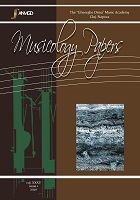Béla Bartók’s Bluebeard’s Castle: a New Avatar of the Myth of Orpheus?
Béla Bartók’s Bluebeard’s Castle: a New Avatar of the Myth of Orpheus?
Author(s): Tatiana OlteanSubject(s): Music, Sociology of Art
Published by: MediaMusica
Keywords: myth; Orpheus; Bartók; Bluebeard’s Castle; symbol;
Summary/Abstract: Ever since its Greek and Roman mythological and literary sources during Antiquity, the myth of Orpheus has been of paramount importance in the edification of the Artist as a key-character of understanding Music as magic and Love beyond death. Over the course of millennia, the myth has underwent numerous transformations, reflecting cultural and creative views of each period. Up to this day, the myth of Orpheus continues to allure composers’ creative imagination. Within the modern and even postmodern tempestuous avatars of the myth in musical creation, the myth stays true to revealing the creator’s inner landscape, his/her reflective searching, and the nature of love between life and death. The current essay proposes a set of correlations between the essential motifs of this ancient myth and the symbols in Béla Bartók’s Bluebeard’s Castle, in a quest for answering the question whether this iconic opera of modernity could be understood, to some extent, as a new avatar of the Orpheus myth.
Journal: Lucrări de Muzicologie
- Issue Year: 34/2020
- Issue No: 1
- Page Range: 52-64
- Page Count: 13
- Language: English
- Content File-PDF

